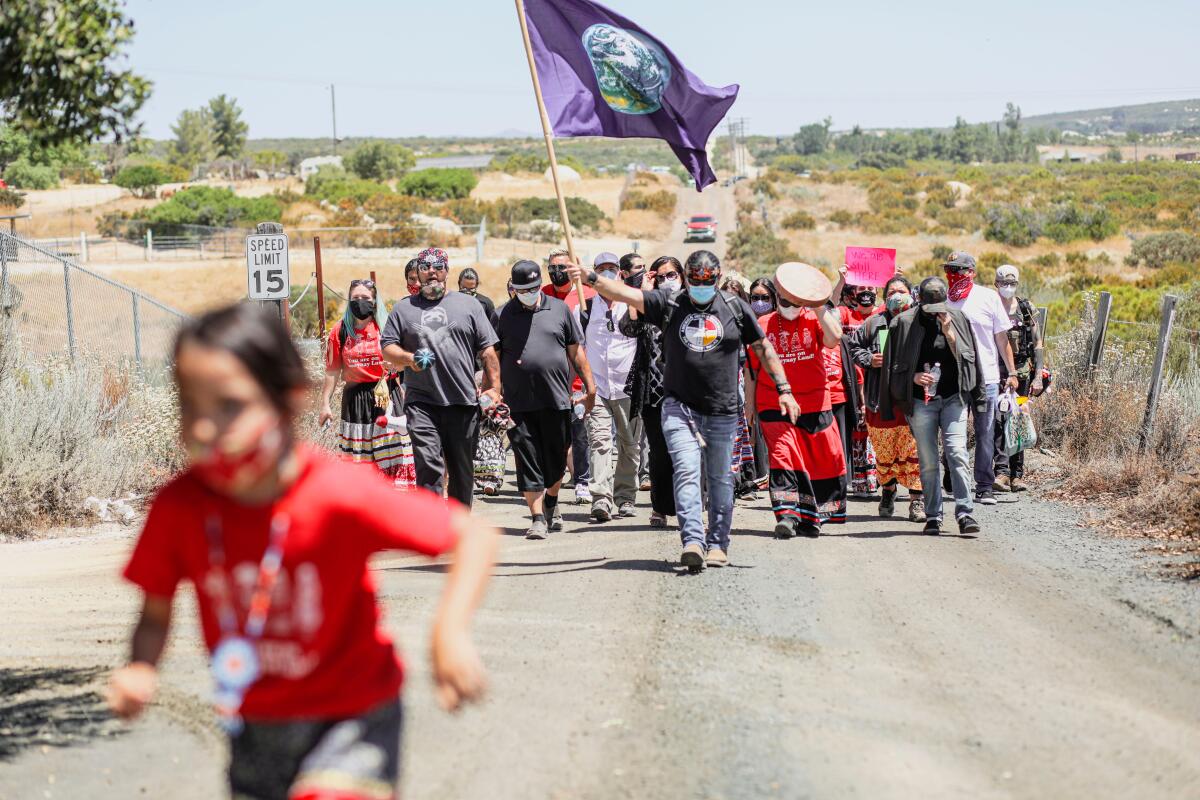Kumeyaay band seeks federal injunction to halt construction of border wall

The La Posta Band of Diegueno Mission Indians is one of 12 bands of Kumeyaay people.
- Share via
CAMPO, Calif. — A band of the Kumeyaay Nation whose native land spans both sides of the U.S.-Mexico border filed a federal lawsuit this week against the Trump administration seeking an injunction to stop further construction of the border wall through sacred, ancient burial lands.
Human remains have been disrupted and unearthed by recent pre-construction blasting at the border, according to the lawsuit and the Kumeyaay Heritage Preservation Council.
“In the Kumeyaay faith, they don’t see the material as ‘human remains’; they see them as humans,” said Tom Holm, executive director of the Kumeyaay Heritage Preservation Council. “When any human bones or particles of human remains are discovered, it’s considered to have a human soul. In other words, they are not looking at material, they’re looking at their ancestors.”
The lawsuit filed in federal court in San Diego on Tuesday by the La Posta Band of Diegueno Mission Indians asks a judge to protect its religious and cultural heritage. La Posta is one of 12 bands of the Kumeyaay people.
This summer, the Kumeyaay and their allies have tried to block the ongoing border wall construction by protesting and negotiating with U.S. Customs and Border Protection. CBP is the agency trying to complete Trump’s promise to build 450 miles of new wall along the 1,954-mile U.S.-Mexico border by the end of 2020.
Kumeyaay people have lived throughout the border area in San Diego and Imperial counties and Baja California, Mexico, for more than 12,000 years. The tribe moved through its ancestral territory via a system of trails, many of which run through the U.S.-Mexico border and have religious significance, according to the lawsuit.
Protesters successfully halted the scheduled construction on July 1, but contractors from the U.S. Army Corps of Engineers working under CBP’s supervision began blasting on the native lands about a month ago, according to the attorney who filed the lawsuit.
“Construction has been temporarily halted at times as result of the protests, but the wall construction, including blasting, has been occurring at a swift pace. That is why we are filing the lawsuit,” said Michelle LaPena, an attorney at Rosette LLP, a majority Indian-owned national law firm representing tribal governments and tribal entities.
Holm said a San Diego County medical examiner certified the material discovered as human, but the CBP insisted it was construction material or PVC pipe.
“The Kumeyaay are not asking for anything more than the same respect and the same cultural respect almost every other faith enjoys,” Holm said.
Jeffrey Stephenson, a supervisory Border Patrol agent in the San Diego sector, said he was aware of the lawsuit. Stephenson said the agency began in March 2020 conducting “outreach and coordination with the Kumeyaay Tribal Nation.”
“Should culturally sensitive artifacts or human remains be identified during the San Diego border barrier project, CBP will coordinate with the appropriate tribes to determine an appropriate treatment plan and repatriation of artifacts and remains,” a written statement from CBP read in part. It was released by Stephenson in response to the lawsuit.
He added the discovery of what could have been human remains was outside the immediate construction zone.
“CBP is aware of possible remains found ... in an area located 200-plus feet south of the U.S. border and outside of the project area,” Stephenson said. “At this time, no significant ancestral artifacts or burial sites have been encountered or disturbed during construction activities within the Roosevelt Reservation.”
The Kuyemaay groups and their allies say the pre-construction blasting to replace the steel fence already at the border is not only desecrating their sacred burial sites, but also preventing their children from accessing sacred educational and cultural locations, such as Tecate Peak, Jacumba Hot Springs and Table Mountain.
A tribal historic cemetery in Jacumba is also along the path of the planned construction. The project involves trenches at least 8 feet deep.
CBP and Army Corps of Engineers need to access 20 to 30 miles of access roads around the project in order to build the 14 miles of new border wall, Holm said.
“They’re bringing in big trucks and bulldozers and trenching machines and port-a-potties and office trailers,” he said, adding none of the surrounding access areas have been surveyed for their historical and tribal significance.
The specific area under dispute is near Campo, which is about 56 miles east of San Diego and 46 miles west of El Centro in the border region south of the Laguna Mountains, according to the filing.
Since March, ahead of elections and amid the coronavirus pandemic, the Trump administration has accelerated wall construction by claiming it is essential work. It increased spending from $11.1 billion to $15 billion, awarding more than $1.7 billion in new contracts.
Fry writes for the San Diego Union-Tribune. The Associated Press contributed to this report.
More to Read
Sign up for Essential California
The most important California stories and recommendations in your inbox every morning.
You may occasionally receive promotional content from the Los Angeles Times.














